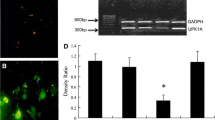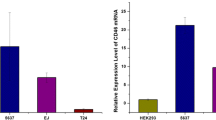Summary
To explore a novel strategy for antisense gene therapy of cancer, the coding sequence of human proliferating cell nuclear antigen (PCNA) cDNA was reversely inserted into the eukaryotic vector pLXSN by molecular cloning techniques and transferred into bladder cancer EJ cells with liposome. The PCNA expression in transferred cells was dynamically detected by immunofluorescence and RT-PCR techniques. Changes of proliferation activities of cancer cells were assayed by MTT colorimetric and cloning formation methods. In the experiment, the antisense eukaryotic vector was successfully constructed and named as pLAPSN. After transfection with it for 1–7 days, PCNA protein and mRNA levels in cancer cells were blocked by 16.74 % – 84.21 % (P<0.05) and 23.27 % – 86.15 % (P<0.05) respectively. The proliferation activities of transferred cells were inhibited by 27.91 % – 62.07 % (P<0.01), with cloning formation abilities being decreased by 50.81% (P<0.01). It was concluded that thein vitro proliferation activities of cancer cells could be effectively inhibited by blocking PCNA expression with antisense technique, which could serve as an ideal strategy for gene therapy of bladder cancer.
Similar content being viewed by others
References
Zdunek M, Korobowicz E. Expression of PCNA in non-small cell lung cancer before and after treatment with cisplatin and vepeside. Pol J Pathol, 2000,51(2):77
1992. 212252
Zeng F Q, Zhu Z H, Lin Cet al. Experimental study of the blocking proliferation effects on human bladder cancer EJ cell line by antisense oligodeoxynucleotide targeting PCNA. Chin J Urol, 2000,21(4): 213
2000, 20(2): 55
Jeziorski A, Blonski J Z, Niewiadomska H. The expression of products of oncogens c-erbB2 and EGFR and proliferating antigens Ki67 and PCNA in primary invasive ductal cancer of female breast. J Exp Clin Cancer Res, 2000,19(1):61
Sakakura C, Hagiwara A, Tsujimoto Het al. Inhibition of gastric cancer cell proliferation by antisense oligonucleotides targeting the messenger RNA encoding proliferating cell nuclear antigen. Br J Cancer, 1994,70:1060
Author information
Authors and Affiliations
Additional information
This study was supported by a grant from the National Natural Sciences Foundation of China (No. 39770739).
Rights and permissions
About this article
Cite this article
Tong, Q., Zeng, F., Qi, Y. et al. Construction of the antisense eukaryotic vector for proliferating cell nuclear antigen gene and its expression in bladder cancer EJ cell line. Current Medical Science 22, 327–330 (2002). https://doi.org/10.1007/BF02896777
Received:
Published:
Issue Date:
DOI: https://doi.org/10.1007/BF02896777




